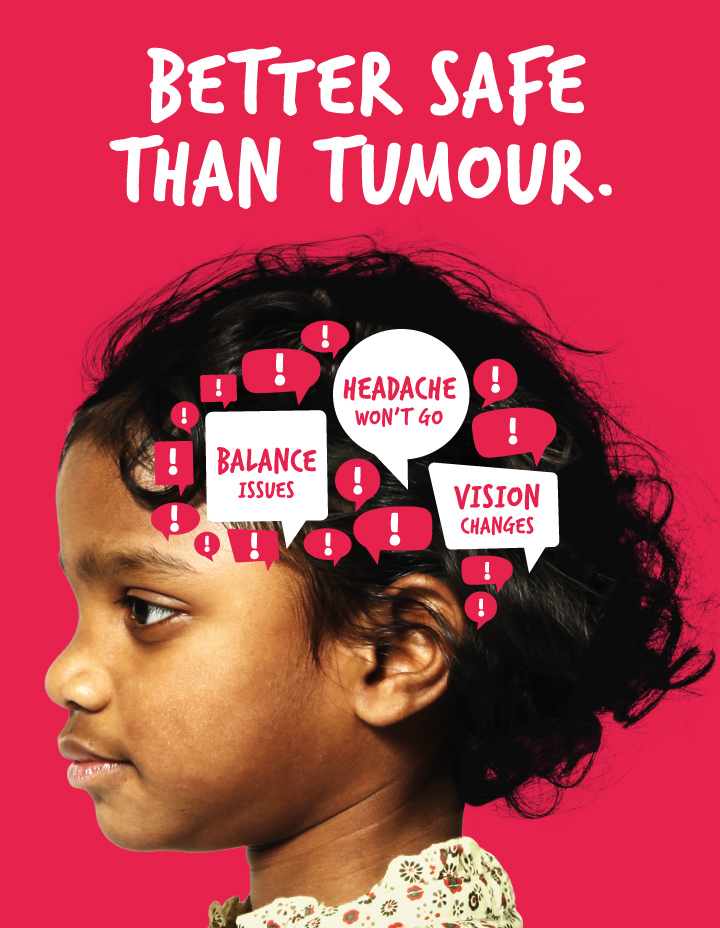Delayed puberty
Delayed or arrested puberty could be caused by a brain tumour. It’s important to remember that brain tumours are rare, but if you’re concerned, you should visit your GP.

On this page, we’ll cover:
- What are the normal signs of puberty?
- What is delayed puberty, and what is arrested puberty?
- What should you do if you’re concerned about delayed puberty?
- I think my child has a brain tumour, what should I do?
Other symptoms
Use our Better Safe Than Tumour symptom checker to check for other brain tumour symptoms.
Talking to your doctor
Learn more about how to approach your GP.
Get your free Information Pack
Our Brain Tumour Information Pack can help you better understand your diagnosis and feel confident talking to your medical team.
What are the normal signs of puberty?
The age at which a girl or boy goes through puberty is likely to be influenced by when their mum or dad went through puberty. For example, a girl is likely to have delayed puberty if her mother had delayed puberty.
Puberty normally starts with breast development in girls and is recognised as being complete when periods have started.
In boys, puberty normally begins with testicular enlargement and is complete when the voice has broken and they need to shave.
What is delayed or arrested puberty?
The time when a child begins puberty can vary greatly between individuals. Some teenagers may feel worried if their development is behind or ahead of their friends’ and classmates’ development. Usually any difference is a normal variation and is not something to worry about.
Delayed puberty
For girls, puberty is said to be delayed if there are no signs of puberty by the age of 13 or if a girl hasn’t started her periods by the age of 16.
If a boy has no symptoms of puberty by age 14, this would be considered delayed.
Arrested puberty
Arrested or suspended puberty is when puberty has started normally, but has not continued. In girls, this includes if periods have started and then stopped again.
What should you do if you are concerned about delayed or arrested puberty?
Teenagers who have arrested or delayed puberty due to a brain tumour are likely to have other symptoms, so you should look for these carefully.
If you’re a teenager and you’re worried about your symptoms, you should make an appointment to get checked out by your doctor. Puberty can seem like an embarrassing or awkward thing to talk about, but your GP will be understanding.
If you’re concerned about your child having delayed or arrested puberty, talk to them, explaining that you think they should see their GP and offer to make an appointment for them. Your teenager may wish to go alone or to have you there for support.
If your child shows one symptom, you should book an appointment with your GP as soon as possible. Or, if they’re experiencing two or more symptoms, you should request an urgent referral to a consultant.
If symptoms are severe or occur suddenly, you should take your child to an emergency department or call 999.
I think my child has a brain tumour, what should I do?
Brain tumours are rare, however, if you’re worried and a symptom persists or if your child has more than one symptom of a brain tumour then:
-
Talk to your doctor
GP appointments are usually quite short, so make sure you find out how to best prepare for your child’s appointment. - Get an eye test
If your child’s symptoms are limited to changes in vision and/or headaches, get their eyes tested by an optician before seeing your GP. - Go to A&E
If the symptoms are sudden or severe, you should go to your emergency department or call 999.
Should I speak to a doctor during the coronavirus pandemic?
We understand you may feel worried about seeking help from your GP during the coronavirus pandemic – but please don’t delay speaking to a healthcare professional.
The NHS and your GP are still here for you and have made changes that make it easier to safely speak to a healthcare professional and get medical help if you need it.
It’s more important than ever for you to prepare for your appointments by understanding what might happen during the appointment and what questions you want to ask.
More information
Download the HeadSmart symptoms card – PDF
Pocket-sized symptoms card that list the common signs and symptoms of childhood brain tumours, which you can take with you to your family GP if you are concerned about your child.
In this section

Know the Signs and Symptoms
Although brain tumours are rare, if you or a loved one are experiencing two or more of the signs and symptoms it’s important that you speak to your doctor to rule out a brain tumour.
Share your experiences and help create change
By taking part in our Improving Brain Tumour Care surveys and sharing your experiences, you can help us improve treatment and care for everyone affected by a brain tumour.